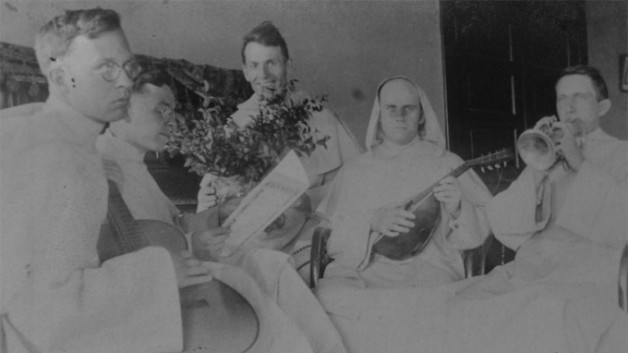A recent newspaper article about the 20th-century folk music collector Alan Lomax described how during his travels throughout the world, from the “American South to remote outposts of the Caribbean and across the ocean to the British Isles and the fishing villages of Italy and the mountains of Spanish Basque country,” he often found the most beautiful music in the poorest areas. These poor people, who could hardly afford food or clothing or what others might call decent musical instruments, were able to produce tremendously uplifting or soul wrenching music, sometimes with home-strung musical instruments, or sometimes merely with their voices. This music helped them to pass the time or to celebrate or to mourn, expressing their human passions in songs of love, joy, or sorrow. I once met a man in Ireland who described something similar: during his childhood, whenever there was a wedding near his home in Cavan at which there were no fiddles or flutes to be had due to the local poverty, his maiden aunt would be brought along to provide music for the dancers by means of her own voice, lilting the jigs and reels with deedledums and ditheriedadles that marked the time for the feet of the dancers.
Throughout history and even today, folk music of various varieties has been able to enrich the lives of people throughout the world at a minimum of expenditure. Simply by knowing how to sing a number of songs, you can enjoy yourself and entertain others in an active way, rather than simply receiving the entertainment offered by television or other passive forms of recreation. With the help of songs you can decrease the monotony of a long journey or laborious work, or express your feelings on a certain occasion in elevated or beautiful language. Most importantly, you can increase the joy of other peoples’ lives by sharing with them the gift of music that you have received, allowing them to sing the songs with you and then possess them themselves. The singing of folksongs puts you in contact with all of the generations before you in your culture who have sung these songs, and puts allows you to play a role in the transmission of this aspect of your culture to those who come after you.
It is not only folk music that involves this aspect of the transmission of culture. For hundreds of years the sacred music of the Church, Gregorian chant, was preserved and passed down by aural instruction, sometimes with the aid of the texts of the chants or at most with little squiggles called neumes, but at other times just by the sound of the voice. What technicians call “art music” also has a strong element of tradition inherent in its practice due to the importance of teachers of technique and interpretation. One of the great attributes of folk music, however, is the flexibility and spontaneity with which it may be performed; it often does not require instruments or particular contexts or environments to be performed, and can be adapted to meet the circumstances of the time and place without scrupulosity about “authenticity,” for the variant texts and melodies we find in critical studies of folk music were in their own time innovations or adaptations, whether self-conscious or not. Folk music allows us to participate in the passing on of our cultural legacy in an active way that respects our tradition but does not paralyze us or prevent our creative contribution to that tradition.
How can one enter into this tradition? First of all, see if anyone in your family or locale has access to a living stream of traditional culture. Perhaps your grandfather was brought up singing at the campfire (my own taught me a wonderful version of the ballad “Samuel Hall”, instructive in particular for its rhythm and the gruffness of voice with which he sang it). You may be able to find expression of this living tradition in other ways, such as singing circles or music festivals or pubs that have folk music. If there is no easy way to find living people to teach you the music, you might take advantage of CD recordings, as long as you don’t make the mistake of giving up your quest to participate in this culture for the sake of just listening to the professionals do it best! If you try to teach your children music, for instance, it is not enough to simply put a tape on and hope for the best—if you want them to sing, do it yourself, show them how to do it and do it with them. In this way your activity will become more than just another task to be fulfilled after walking the dog and washing the dishes, but something that brings the family together in unity of mind and voice.
Although it may be tempting at times to react to the current cultural climate by indulging exclusively in religious observances—to sing only hymns or read only the Bible—authentic folk music helps to fertilize us so as to receive the Gospel and allow it to take root in our lives.
This essay first appeared in Dominicana 54:1 (Spring 2011) 5-7.







